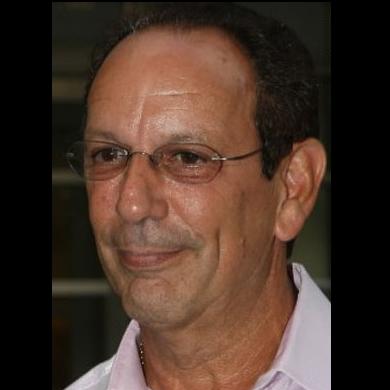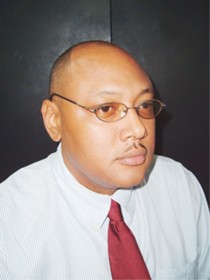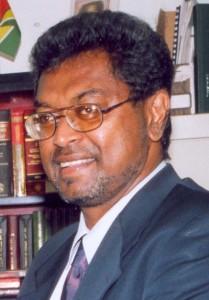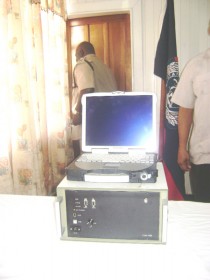Recent revelations in a US court claiming links between members of the government and drug trafficker Shaheed Roger Khan have seen six political parties joining forces to sensitize international organizations on the matter and force greater accountability from the government.
The parties involved in this action are the Alliance for Change (AFC), Guyana Action Party (GAP), National Front Alliance (NFA), People’s National Congress Reform (PNCR), Unity Party and the Working People’s Alliance (WPA).

At a press conference held yesterday at the Cara Lodge, the AFC was represented by its Leader Raphael Trotman, Party Chairman Khemraj Ramjattan and Executive Member Clayton Hall, GAP by Everall Franklin and the NFA by its Leader Keith Scott. Opposition Leader Robert Corbin represented the PNCR, while the WPA was represented by Executive Member Desmond Trotman and Co-Leader Dr Rupert Roopnaraine.
During the press conference, Trotman of the WPA said members of the political parties had met on Monday “to discuss the unfolding revelations in the Robert Simels trial in the federal court of New York, USA and the grave implications that such revelations may have for national security and good governance in Guyana.” At that meeting “it was agreed that a unified approach be activated to realize greater accountability, justice, res-pect for and observance of the rule of law and, generally, the establishment of good governance practices.”
Reading from a prepared statement, he said “the parties, have, accordingly agreed to compile a comprehensive dossier cataloguing the government’s human rights abuses, including extra-judicial killings, torture and complicity with known organised crime gangs and narco traffickers and the resulting corruption in high office.” He said “the dossier upon completion will be submitted to local, regional and international bodies, including the courts with the appropriate jurisdiction and released to the media and the public.”
Trotman also said that “arrangements are also being put in place for the mounting of a robust public education campaign to alert our citizens of the lawlessness of the PPP/C government, since that is considered the single major obstacle to national cohesion, the development, peace and security in Guyana.”
And according to the statement, the campaign will be always conducted “on the basis of consensus and in accordance with the laws and the Constitution of Guyana.”


The statement also indicated the commitment of the parties to meetings with civil society organizations, including trade unions, professional associations, religious bodies and private sector organisations in this campaign.
In explaining the joint initiative, Roopnaraine said that it was a campaign that represented the belief that the combined energies of efforts of the parties would have a greater impact as opposed to single party operations.
Corbin said that he was prepared to work with all parties on this matter which was one of “national concern” since it affected all Guy-anese.
Fear and smear
Ramjattan stated that the reply of the government to these allegations was one of “fear and smear” and he opined that the combination of resources could produce a better counter to this campaign.
When the question about the purpose of sending the dossier to international agencies was raised, there were differing views as to what this would achieve. Raphael Trotman opined that while Guyanese need to solve the problems themselves, international bodies needed to be sensitized about the matter and made aware that there was a united effort being made by the opposition parties. He, however, emphasized that it was in no way begging the international organizations to come and fix the country’s problems.
Franklin opined that the problem needed to be solved with the present government’s involvement and he said that the government needed to be engaged.
But Corbin opined that there is limited hope that the government would facilitate an inquiry and the citizens of the country need to stand up and force the administration to accountability. He further stated that based on the administration’s behaviour, if the government conducted an independent inquiry by itself questions about its credibility will arise. Corbin said this was why the PNCR was calling for an international body like Interpol to conduct an investigation, although he said that this body may have its own limitations in how far it could intervene in such a matter. He argued that there were other human rights bodies and the International Criminal Court which could be explored. Corbin said he hoped that if the parties accumulated the right evidence, they could trigger some international body to carry out the investigations, as he pointed out that this had happened elsewhere.
Roopnaraine argued that the extent to which international bodies respond is dependent on the level of indignation that is demonstrated locally. He said that is why the parties will be teaming up to launch an aggressive education campaign, which he identified as being crucial until the requisite level of national indignation is achieved. The WPA leader said this campaign could include public meetings and civil society marches among other activities.
When asked specifically about the apparent shift in attitude regarding marches, Roopnaraine said the government has worked hard and overtime to criminalize street protests. This, he opined, was the case in 2001 and 2006 and he stated that the government kept linking protests with violence. He, however, emphasized that this initiative is one in the interest of peace.
Meanwhile, when quizzed about the legitimacy of the evidence, should Simels be acquitted by the US Court of the charges, the political leaders were adamant that the evidence would still be relevant.
The AFC’s Trotman said the evidence given was sworn testimony which only confirmed what persons locally already had some information about, a fact which Corbin supported.
Ramjattan contended that both the prosecution and defence have come up with evidence linking the Guyana government to Khan’s activities.
Trotman also opined that the Director of Public Prosecutions should have requested to see the files on certain matters and given advice for prosecution to be done here. He said that Khan’s decision to plead guilty had its own implications about what sort of activities went on locally adding that the will to prosecute is simply not here.
Surveillance equipment

The leaders were also asked about their attempts to ascertain, firstly from the US government whether it gave permission for the shipment of the surveillance equipment and secondly from Smith Myers as to whom from the Guyana Government had given permission for this transaction.
In response, Raphael Trotman said that back in 2002, when he was a member of the PNCR, he was aware that the then PNCR Leader Desmond Hoyte had written to both the US government and Smith Myers requesting information but it was not provided. He said that Smith Myers acknowledged the request but said that it could not be answered for national security reasons.
However, he said the joint opposition will now make a fresh attempt to find this out from the relevant authorities.
Meanwhile, Ramjattan disclosed that the parties are currently trying to get from the Commissioner of Police information about Charles Chapman, who allegedly travelled to Guyana to train persons in the use of surveillance equipment. He said that they want to ascertain when he came to Guyana and how long he spent in the country. Ramjattan pointed out that immigration documentation should be able to supply this sort of information. Observers have noted that Chapman’s testimony could expose the entire conspiracy if he revealed who had handled his travel arrangements, who he had met while here and who he trained.





